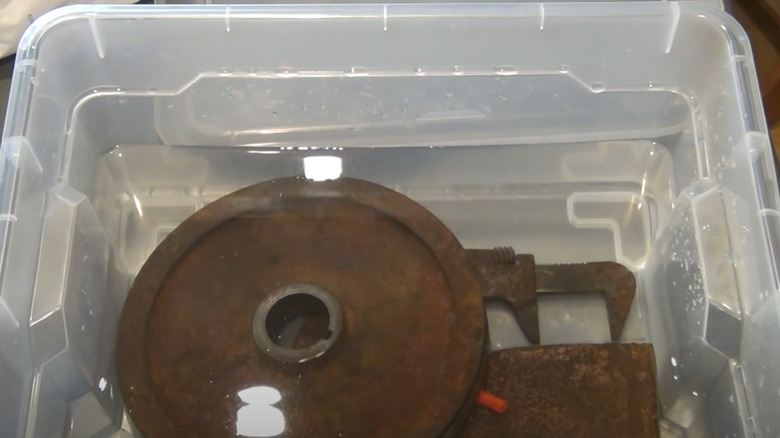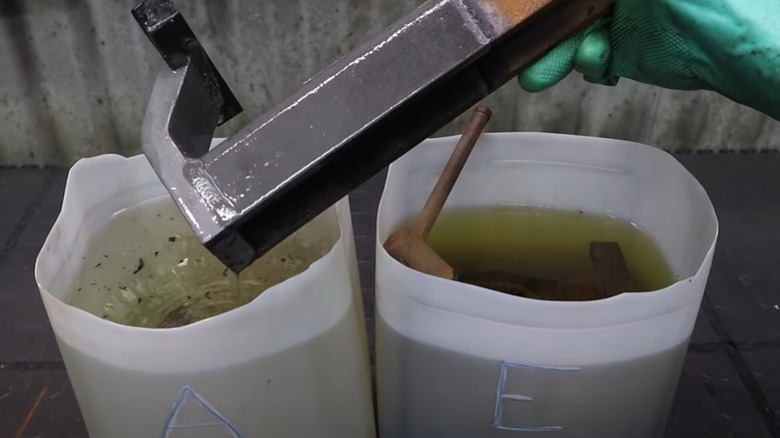The Must-Have Product You Need To Tackle Stubborn Rust
We may receive a commission on purchases made from links.
Think back to eyeing that dilapidated structure that was once your prized garden table, the momentary panic as you spot rust gnawing into its once invincible metal. Or the sinking feeling when you grasp your once pristine toolbox, only to be met with a crumbly rusty surface. Recognized by touch, sight, or the earthy scent it releases, rust, once entrenched, wreaks chaos on our metallic possessions. The reddish layer of iron oxide is the result of time and exposure, where iron-containing metal surrenders to the ceaseless assault of oxygen and moisture. The good news is that you can tackle rust stains naturally with kitchen ingredients. Enter citric acid.
In the process of rust busting, citric acid charges forth by dissolving the stubborn curtain of iron oxide, leaving behind the treated surface almost in its original, unblemished form. Citric acid strikes a perfect balance here: It won't demand as much elbow grease as sanding and is safer than its more potent counterparts like hydrochloric acid, yet it's potent enough to tackle surface rust gracefully without undermining the integrity of the base metal. After all, isn't there immense satisfaction in bringing back the shine to your favorite collections, all with something natural you could pick up from your nearest grocery or health store? As for the price, 2 pounds of Milliard Citric Acid will set you back only $14.99 on Amazon.
Tackling stubborn rust
The conquest to remove rust naturally begins with gathering citric acid powder, warm water, a water tub, a scouring pad or a rugged brass brush, and your rusty metallic items. Your next step is to clean any dirt or grime from the object — water and a sponge fit the bill, though you can also use WD-40 if necessary. When you're done, shift your focus to whipping up your rust-busting concoction. Depending upon the severity of the rust, the proportion of the citric acid should vary. However, for the sake of efficiency, we'll plunge into this endeavor with a tub of 5 to 10% citric acid powder and warm water.
Next, submerge the rusted object in the solution for a rejuvenating, rust-eradicating bath. If it's impossible to dunk the item fully, simply apply the solution directly to the rusted areas. Let the object soak for 30 to 60 minutes, or for those heavily rusted pieces, give them a couple of hours. Anything higher runs the risk of damaging the metal. Small air bubbles racing to the surface and rust flakes floating in the solution will signal the onset of the rust-eating party. Soon, you should see the solution turn from clear to murky. But we're not done yet. After the acid bath, remove the treated item and scrub any lingering rust with a scouring pad or brass brush. Finish by rinsing off the object with water and drying it thoroughly.
Caveats for removing rust with citric acid
In the pursuit of removing rust from iron-based metals, citric acid pulls no punches. However, its concentrated form can cause burns if it meets bare skin or eyes. For this reason, wear gloves and safety glasses for protection. At the same time, the word to the wise is not to mix citric acid with bleach — the menacing duo births chlorine gas, which can prove lethal when inhaled. Additionally, beware of potential discoloration or etching on certain metals. To be safe, conduct an initial test on a small patch or piece of metal before launching a full-scale attack.
Heavily rusted items, much like fortified enemy barricades, may demand multiple rounds of treatment or soaking in the citric acid solution for an extended period. Moreover, though citric acid can be used indoors, a well-ventilated area is a must. When you finally go on the offensive and scrub, deploy a soft-bristled brush on delicate surfaces to prevent abrasion.
Regarding disposal, check your local regulations — some might prohibit large amounts of used citric acid for the standard drain. Recommended options include stashing it in your trash bin in a tightly sealed container enclosed in two bags or neutralizing it with water or baking soda. If citric acid doesn't charm you, white vinegar or lemon juice can step up in its place. Lastly, coating your rejuvenated item with mineral oil can prove effective in preventing future rust development.


